 image by Ehteshamul Haque Adit on Unsplash
image by Ehteshamul Haque Adit on Unsplash
 image by Ehteshamul Haque Adit on Unsplash image by Ehteshamul Haque Adit on Unsplash Do you know the allegorical image known as 'The Vinegar Tasters'? It is related to Eastern philosophies and may be helpful to reflect upon as we end one calendar year and begin another, particularly as today’s Gospel reading offers us symbols brought to the Christ child from the East. For which gifts are we to offer at this time? What pathways are we seeking to tread into the future?...
0 Comments
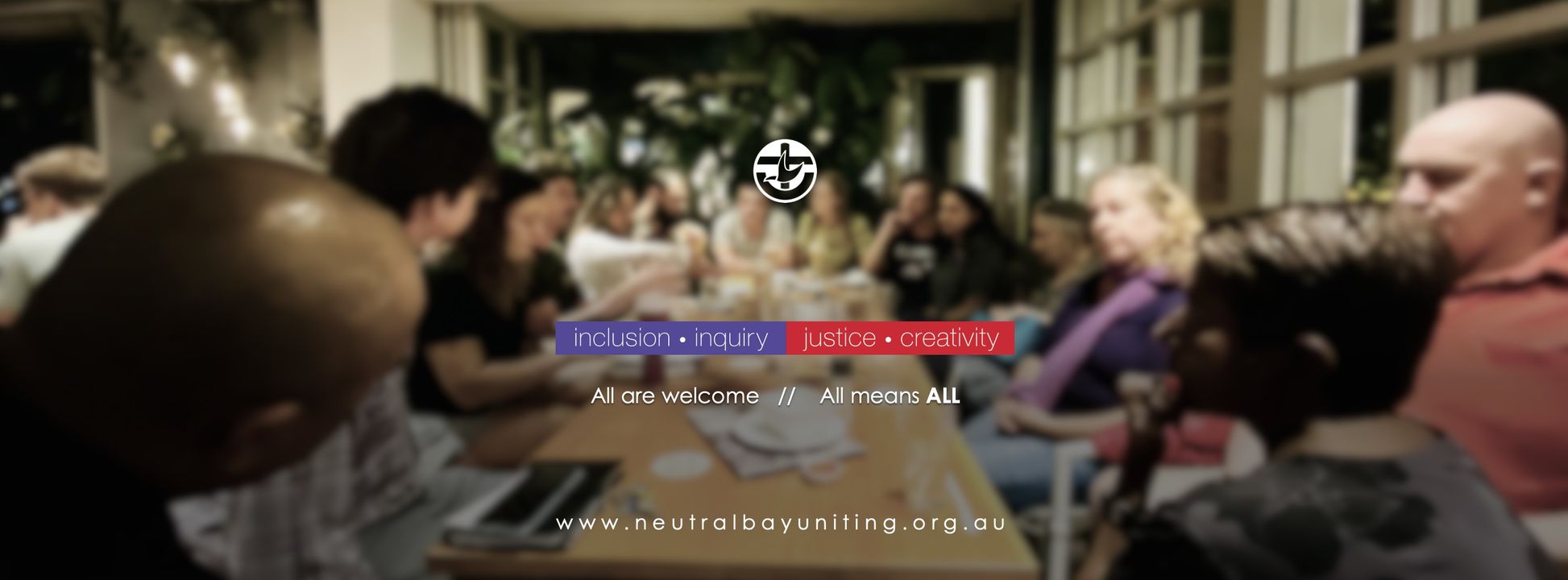 Alex may, or may not, remember the first time we met. It was at the start of a new year in which, finally, I was resolved to affirm my gender identity publicly. Dressed as a female, that Sunday I consequently chose MCC at Petersham as the safest space in Sydney to go to Church – Pitt Street Uniting Church would also have been fine but I already knew too many people there and that would have caused premature attention elsewhere. The MCC worship was uplifting and the community immensely welcoming. Over coffee, I then remember a gorgeous young man speaking beautifully and articulately, passionately and gently, about faith, life, and the possibilities of joy and community for us all, whoever we are. He opened us up to the experiences he was having in his studies in the USA, and some of the wonderful new life of progressive churches there. That young man was Alex, and, little did we know it, but our lives were to intersect frequently in the following years. Not least, after I came out publicly, MCC Brisbane was my second spiritual home, alongside the terrific Milton Anglican community. As Pastor there, Alex helped accompany me through that stage of life, enriching Penny and I, as well as so many others, with his gifts and love. Hopefully, we too offered some mutual support. Indeed, just as Penny and I were honoured to share in Alex’s ordination at MCC, and to walk with him through that time, so the last thing we experienced in Brisbane was a blessing from MCC for our journey into new ministry at Pitt Street Uniting Church, conducted by Alex. It has therefore been such a joy to be reunited with Alex here in Sydney, sharing not only times of struggle – such as the queerphobic attacks upon Pitt Street and the wider LGBTIQA+ community earlier this year, but new steps, such as that for which we gather today. All this too, is part of the shared inspiration which Penny and I, like Alex, draw from the extraordinary text of the book of Ruth which we have just heard… 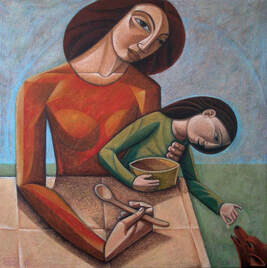 Crumbs of Love, by Michael Cook Crumbs of Love, by Michael Cook How do you feel about being called a dog - and/or not quite human, or sub-human, unnatural, intrinsically disordered, not biological, unclean, heathen, pagan, infidel, heretic, wild, rabid, crazy, illegal, alien, or one of the long, long, list of ethnic[1], gendered, and other slurs some continue to endure today? So many people know this only too well. If you have more than one type of marginalised human identities then you may face this even more intensely. Today’s Gospel story puts such ‘dogs’ firmly in the centre of life and faith, in the figure of the one named as a Canaanite woman. Note well: this is someone not even given a name. For denying people’s true names and authentic identities is a game as old as time, and it is still well and truly alive today. Every day, there are people treated like dogs who, at best, can only aspire to the crumbs which fall from the tables of the privileged. This story therefore is still our story as a human race, and the light it brings comes from speaking in crumbs… 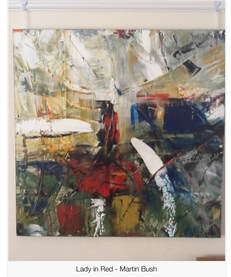 Maybe what she wanted to do was punch Him (God) But she couldn’t So Sarah laughed Didn't Suzanne Terry put it well in her poem 'Sarah Laughed'? How many of us have wanted to punch God, or worse, for what has happened, or not happened, to ourselves and others? In Genesis chapter 18, Sarah laughs out of her deep experiences of sorrow, anger, and utter frustration, with God. After all she has experienced, as a childless migrant woman, in an ancient patriarchal culture where child-bearing was so important, how dare God turn up and now declare fresh hope. Why take so long to give this gift? Why put Sarah through such trials? We can easily identify. As elsewhere in the Bible, we are not presented with a simple moral or spiritual inspiration. Rather we encounter a very human struggle, with which we are invited to wrestle. Suzanne Terry’s poem is a product of this. For she was responding to a book entitled Those Who Wait: Finding God in Disappointment, Doubt and Delay. This, like other writings by Tanya Marlow, seeks to explore how we live with the realities of suffering…  photo: John Canada on Unsplash photo: John Canada on Unsplash .A number of years ago, Penny and I were exploring the possibility of employment with a wonderful pioneering female bishop. In the course of her hospitality she introduced us to a fellow, nearby, bishop in case he also had a parish to offer us to work in. He however took one brief look at us, and, at once, abruptly asked ‘do you believe in the Resurrection?’ It was said in a very demanding, and almost accusatory, tone. Taken aback though we were, we actually responded very well, saying together, and in a somewhat incredulous tone, ‘why yes, of course!’ The bishop was nonetheless not at all impressed and exited immediately. For, of course, his question was not one to which he really expected an answer, or at least one in which he was actually interested. Like the notorious enquiry ‘when did you stop hitting your wife?’, it was a deliberately loaded question, containing its own assumptions. Like the Sadducees’ question to Jesus in today’s Gospel reading, it was also not really about resurrection at all. How often, I wonder, are our own questions like that too? When we talk in faith spaces, how much do our own interests intrude? How do we keep open to the mystery of resurrection?... 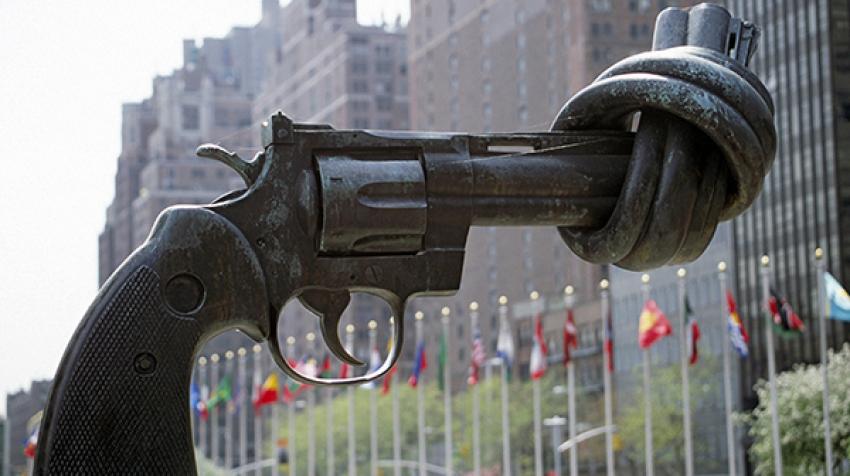 photo: United Nations ‘Towards a Planet-wide Culture of Non- Violence’ photo: United Nations ‘Towards a Planet-wide Culture of Non- Violence’ One of my favourite stories of transgender resistance to oppression comes from India. A group of hijra people were being harassed and humiliated. Of course, this was/is nothing new. Whilst hijra have their gender officially recognised on the Indian subcontinent, they are outcasts among outcasts, typically living on the margins, in the very poorest quarters, and they stir a range of reactions in others. Like all marginalised people, behind their own remarkable brave lives lies terrible and very real fear, and many sad stories: of the sex trade and exploitation, of cruel and/or dangerous castrations, of being cast out and shamed.[1] In one community this shaming grew intolerable. Exclusion, humiliation and actual physical and sexual violence grew exponentially. What could the hijra do? The law, politicians, even religious leaders, did not care. They were actually deeply complicit. Then, after one particularly awful day, the hijra hatched a plan. In the early hours of the morning, after stripping off their undergarments, they would walk, en masse, to the houses of the worst abusers, rattling pots and pans, bells and whistles, and anything they could put their hands on, seeking to wake up the whole neighbourhood, and make the maximum impact. This they did, raising a mighty commotion. Then, they waited whilst the worst offenders, particularly the leading fathers of the community, opened their doors and windows, and came out to see what the terrible din was all about. Standing in line, shoulder to shoulder, the hijra together then took hold of the hems of their dresses, and, with an extraordinary shriek and song of pride, lifted them up, and displayed their genitalia, in all their glory. All those who watched on were taken aback, not only with shock, but with shame. For the hijra had turned the tables on them. The shame now rested on those who were rightly shameful. The powerless had, if only temporarily, transformed the powers that oppressed them, into tools of life and liberation...  Many years ago, before entering ordained ministry, I worked for the probation service in England. I was an assistant house manager for a hostel for what were called ‘hard to place’ ex-offenders. ‘Hard to place’ – whom do you think that included? ... Well, it referred both to those who had committed the most serious of crimes and to those who were liable to cause physical and reputational damage, including those who had committed arson or who might be seen by the wider community as scandalous. We had men who had committed so-called ‘minor’ offences – some of whom, to be honest, could sometimes be the most awkward residents of all. We also however sometimes had men who were on ‘life license’ for taking the lives of others. Certainly, we always had at least one man, or several, who had committed sexual offences. Perhaps that group of people were also always of the greatest underlying concern, at least in terms of risking public outcry and our own limits of hospitality. For appropriate relationships with those who have committed sexual offences is rightly vital. What then does that mean, today, for churches?... 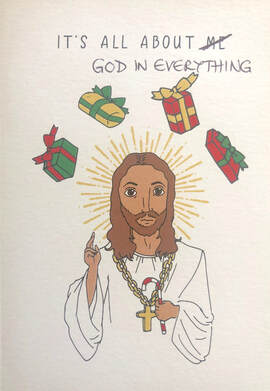 One of the Christmas cards that struck my eye this year was one that has a picture of a Jesus figure on the front, accompanied by presents around their head, and the proclamation ‘It’s All About Me’. What do you think about that? I suspect that it is a gentle way of poking fun at both the tendency of some Christians to be somewhat sanctimonious about ‘possession’ of our end of year communal festivities, and also the way in which we often want Christmas to meet our own expectations. This often begins as children - doesn’t it? – when we human beings don’t quite receive the magical Christmas for which we were hoping: maybe when we don’t have quite the special present we were expecting; and/or when our Christmas meal, or worship, isn’t quite right, or too much; or when we, or others around us, aren’t able to maintain the proverbial spirit of peace and goodwill in all our interactions. Sometimes our expectations are just too much, or too unrealistic. Sometimes they are quite right, and we are let down by events or by others. Either way, we may feel a little betrayed, especially if hopes for ourselves are involved. Perhaps however, in the disappointments of our personal Christmases, we may still learn a little of the wisdom in the birth of Christ. Fresh light may then stream in, particularly when we start looking beyond ourselves – not simply to the Christ child, but to everything about them. This may be part of the learning of this Covid-19 year, in which many Christmases are not as the world as a whole would hope. For, like the first Christmas, pictured in various ways in the Gospels, we have had to learn that it is not ‘All About Me’. If God is among us – the central message of Christmas – then he/she/they are everywhere, but not as we expected, and all of us are, truly, ‘in this together’… Those of you who have read Elizabeth Gilbert's best selling novel, Eat, Pray Love, or seen the movie,may remember that towards the end of the story she identifies a key word that speaks to her life. It is the Italian word attraversiamo 'let us cross over'. Our gospel story today embodies that word. It is a story about power, and faith and love and in each of those deeply important areas of human life it shows the importance of a willingness to cross over.
Jon Inkpin for Holy Innocents, Sunday 28 December 2014
Today’s feast of Holy Innocents is an alternative in our church’s lectionary. For we could use other readings today. Perhaps some of us would feel more comfortable with them. After all, today’s Gospel is a tale of terror. It speaks about Jesus as a refugee. It tells of immense political violence. It recounts the massacre of children. What kind of a ‘good news’ and Christmas is this?... Well, actually, it is very much a ‘good news’ story: both for our own day and for eternity. Let me briefly share three things which are important about today’s Gospel reading: three things which make the otherwise terrifying feast of Holy Innocents a vital element of Christmas good news…. |
Authors
sermons and reflections from Penny Jones & Josephine Inkpin, a same gender married Anglican clergy couple serving with the Uniting Church in Sydney Archives
June 2024
Categories
All
|
 RSS Feed
RSS Feed